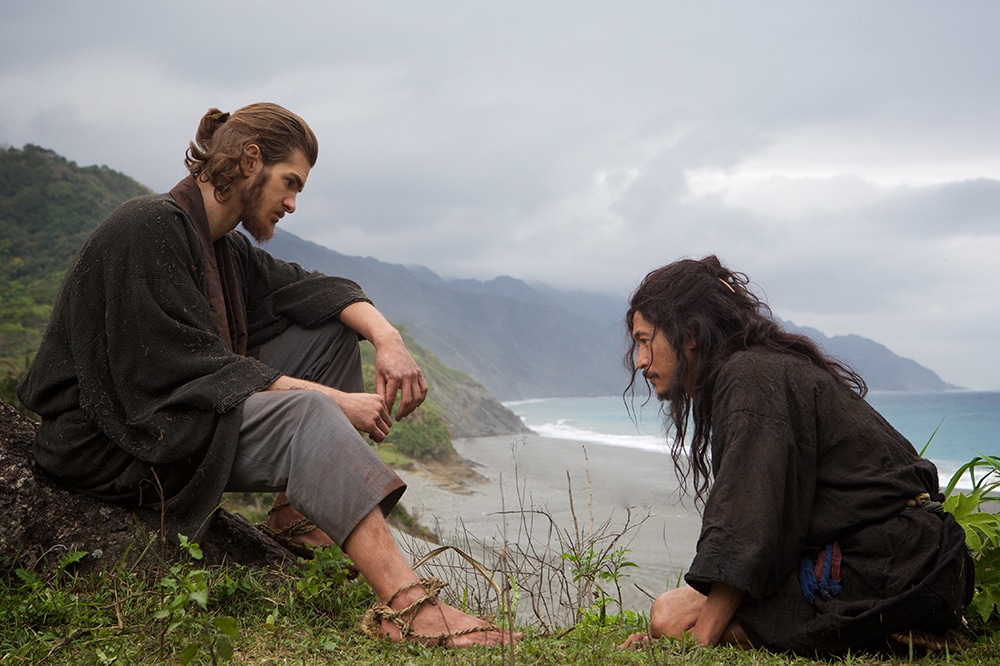Sure that they are about to be sent on a grand mission, Rodrigues and Garupe are soon disabused of the notion. Believed to be the only Catholic priests left in Japan, they'll have to start from scratch with whatever they can get, a compromise that begins with their drunken, lice-infested guide Kichijiro (Yosuke Kubozuka). An apostate racked with guilt over his actions, Kichijiro manages to smuggle Rodrigues and Garupe into Japan where they are embraced by a village of Christians worshipping in secret. Here, the two Jesuit monks find their calling fulfilled and are inspired by the faith and fervor of the people. However, this version of paradise comes to an end as inquisitors arrive, scattering Rodrigues and Garupe and sending them on different paths. The film follows Rodrigues as he flees the inquisitors, hunts for traces of Ferreira, and wonders why the solace he used to take in prayer isn't working like it once did.
Scorsese and co-writer Jay Cocks, in adapting Shusaku Endo's novel, take their time in showing Rodrigues' spiritual and physical struggle. Scenes are essentially repeated, and beats play out similarly with the only plot advancement a gradual eroding of resolve. At 161 minutes, a ruthless editor could conceivably cut a significant chunk of the film, but the monotony and repetition is part of the point. At their first destination, when Rodrigues and Garupe are enacting the Platonic Ideal of priesthood, they are forced to stay in an isolated cabin at all times, lest the inquisitors catch them. The reverence of nighttime Masses is intercut with the pure drudgery of endless days in the cabin, something that is its own form of torture in advance of the more brutal version the film began with.
Kichijiro provides another source of redundancy, someone who gets the letter of the law when it comes to the Catholic sacrament of reconciliation, but is blind to the spirit of it. He is both a person who apostatizes and someone who seeks forgiveness, a cycle he repeats over and over again, and Rodrigues must continue to absolve him. The first time Rodrigues does so, it's a beautifully cathartic moment. The last time, it's submission to someone who has found a loophole and is making a mockery of Rodrigues' earlier elation. Silence finds the absurdity and the solemnity in the vocational life, and shows that religious fervor fades as surely as any other emotion.
What could keep that fervor going, divine inspiration, is kept at arm's length. A god that would provide signs and encouragement is far away from the proceedings of Silence. Coincidences of the lucky and unlucky sort occur, a fine development as Rodrigues, Garupe, and their flock are the type to read coincidence as a sign. If they are signs, the messenger is inflicting their own brand of torture. Mystical refuges are denied to the characters, and on occasion, supposed miracles are immediately followed by a negative turn in fortune. To paraphrase Louis Pasteur, hallucination comes to the prepared mind, and when Scorsese allows some possible miracle to occur, it's in a state of duress where doubt can be placed on a vision.
While Scorsese is depicting a faith-filled life in unsupportive territory as cruel and unnourishing, he's also somehow charitable towards all parties. The Jesuit protagonists aren't the fools they could easily be made out to be. They have their mission, and they pursue it with kindness and passion, both ready to add their names to the long list of martyrs who lost their lives in Japan. They also both have their blind spots and no small amount of cultural arrogance, teaching the Japanese their language but never learning anything themselves. Conversely, the Japanese antagonists, despite being torturers and oppressors, never rise to the level of pure villainy. Some of this is surely historical context, as at the same time on the other side of the world, a film could've been made about Huguenots being oppressed by Jesuits like Rodrigues in France. More is the performance of the inquisitor himself, Inoue Masashige (Issey Ogata), somehow charming in spite of its imperiousness. I never found myself hating the inquisitors. An early execution finds Christian converts hung from crosses in advance of the tide, left to slowly drown as the waves crash into them. Scorsese evokes that kind of natural implacability with the Japanese response to the missionaries, as if the Jesuit's work is never going to take root and all they're doing is trying to drain the mighty ocean with a leaky bucket.
Silence is a rich and complex film, with more unmentioned themes of self-aggrandizement, the nature of compassion, and the priority list of medieval Catholicism. Its repetitious and intense nature does not lend itself to rewatchability, though it's arguably the best looking film in Scorsese's long oeuvre. In continuing his career-long examination of faith, he's still as stymied by it as he's ever been. Silence offers few answers to the grand cosmic questions, only an ellipsis and a dejected shoulder shrug. These things are unknowable, but what Silence does assert is the arrogance in presuming to have the answer and that arrogance is far more comforting than uncertainty. B+

 RSS Feed
RSS Feed